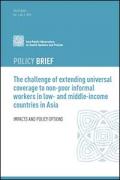Publications - Released in 2015
Many low- and middle-income countries (LMICs) in Asia have adopted the goal of universal health coverage. In principle, universal coverage includes providing financial protection to the whole population. This is a goal. In practice, universal coverage cannot be achieved at once, but involves progress along a path towards achieving complete population coverage. This is especially true in LMICs, where resources are constrained and per capita health expenditures are low. Experience shows that LMICs generally begin on the pathway to universal coverage by implementing different prepayment mechanisms targeted at particular sections of the population.
The implementation of prepayment mechanisms for non-poor informal workers in LMICs is a relatively new policy area, with many unresolved issues. Questions being raised are whether compulsory schemes such as social health insurance (SHI) are effective in covering nonpoor informal workers, whether voluntary schemes such as communitybased health insurance (CBHI) can be used to scale-up coverage of non-poor informal workers, and whether complete subsidization of non-poor informal workers can create perverse incentives for remaining in or moving into informal employment.
Downloads
Organizations
- World Health Organization (WHO)






